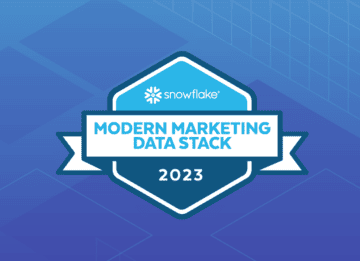Customer Intelligence for a Cause: Identifying Influencers with Identity Resolution
Concord Direct Gives Clients Maximum ROI with Strategic Peer-to-Peer Campaign
Concord Direct, a direct response agency, works with many nonprofits using marketing techniques (direct mail, social, emailing, and paid advertising) to achieve engagement and fundraising. However, it’s rare for nonprofits to see their initiatives and campaigns result in a flurry of donations overnight. With limited marketing department budget, nonprofits look to maximize their spend and still receive a good ROI.
One of the ways the nonprofit industry has adapted— and how Concord Direct provides value to its customers— is strategic fundraising through the use of social data to target influencers for engagement and fundraising. When done right, it can be extremely effective in driving direct response fundraising results (both online and off). In 2017, online marketing drove approximately 7.6% of all dollars raised by nonprofits — a number that is increasing every year. But in order to have success with their online fundraising efforts, organizations have to first find and engage their biggest advocates and encourage them to mobilize their network.
The Sierra Club reached out to Concord Direct for help developing such a strategy. The goal was to get early adopters to create profiles and sign up for petitions on the newly developed AddUp.org site, which helps people find different causes based on location and interest, prior to its official launch. The idea was that once the site was made available to the general public, the active early adopters, uploaded petitions, and flurry of engagement would encourage others to take action or eventually make donations.
The first step in developing an influencer audience involved digital identity—knowing contacts on a personal level to evaluate and target the best ones for outreach. To gain this deep contact knowledge, Concord Direct turned to identity resolution.
“The identity problem has historically been the uncrackable nut required to engage people across the social Web. In this super fractured world of online engagement, trying to identify a single consumer is tough. For years, we have relied on FullContact to solve this problem for us,” said Peter Genuardi, Executive Director of Digital Services at Concord Direct.
Getting Clients Their Dollars’ Worth Through Social Data
To identify the best influencers within the Sierra Club’s database, Concord Direct needed a full view of the contacts within that database. First, they looked at a list of actual advocates and donors and the actions they took to support policy issues. Then, they enriched that segment of contacts using person data from FullContact. The person data, powered by a patented identity graph, displayed the contact records with accurate demographic, social, and affinity data for deeper insights into these contacts. With this additional layer of social data (number of networks contact was active on, number of followers and number of connections), they created a group of advocates. This group of people would serve as their primary focus and were deemed the people most likely to take action on the new website and thus, invited them to participate.
Identity Linking
Using a contact database supplied from the Sierra Club, Concord Direct enriched those accounts to create a complete contact profile using person data. The depth and breadth of the patented identity graph produces over 100 social networks and supplies affinities across 6,000 subject areas. For the Sierra Club, connecting email addresses to social handles enabled Concord Direct to connect social network information with those likely to participate in this campaign.
Influencer Campaign
Powered by the insight into who will most likely advocate for this new website, Concord Direct could prioritize their efforts. Once they asked advocates to sign a petition on the new website, they used the social data to ask them to invite others on Twitter to participate. The second email showed five Twitter profiles and suggested they ask these strangers to sign the same petition. The tweets were prewritten and with one-click, the influencers were able to advocate on behalf of the Sierra Club.
Segmentation
Instead of using a massive email blast to all of the contacts within the database, Concord Direct used social data and previous response characteristics to segment on a list of people who were most likely to take action and how many connections they had on social media. The target group were then given emails and social ads urging them to participate on the website. By messaging on the preferred platform of advocates, Concord Direct increased their chances of reaching the right people with the right message.
Higher Response Rate with Authentic Interactions
The campaign worked well for the Sierra Club — they were able to onboard nearly 20,000 people to the new website in just three weeks before its official launch. By combining social data with insights into their biggest advocates and those most likely to respond, Concord Direct was able to replicate a strong, human to human relationship through social advocate outreach. The response rate when asked by a total stranger on Twitter was 6%, which was just as high as when Sierra Club asked by email. As email response rates to these types of advocacy appeals continue to fall, this human-to-human approach offers a strong foundation for solving a pressing problem facing the nonprofit sector.
“What we saw was that the ask directly from the Sierra Club got just as good results as an ask from a ‘stranger’ on Twitter,” said Genuardi. “I was surprised to see that people were willing to take action from a complete stranger versus when they were asked by a brand.”
Better, Smarter Spend for Non-profit Marketing Campaigns
Concord Direct has implemented person data into client campaigns to save time and resources while boosting donations and fundraising. Using social data, the company can advise clients on the best use of their marketing dollars in order to campaign wisely.
For example, “If there are people in the database on Twitter who have never responded to a piece of direct mail, we’ll use this insight to stop sending them direct mail and advertise to them digitally,” said Genuardi.
Using FullContact’s person data gave the Sierra Club the ability to segment their audience, identify influencers, and personalize messaging that fostered action. Concord Direct plans to continue providing their clients with identity resolution to help with cost effectiveness of campaigns and maximum ROI.
Recent Blogs
-
 September 21, 2023 Discover How FullContact is Building Trusted Customer Relationships through Snowflake's Native Application Framework Customer 360, Website Recognition, Identity Resolution
September 21, 2023 Discover How FullContact is Building Trusted Customer Relationships through Snowflake's Native Application Framework Customer 360, Website Recognition, Identity Resolution -
 September 20, 2023 Transform Your Customer Experience with FullContact Customer Recognition and Boost Your Conversions Website Recognition, Identity Resolution
September 20, 2023 Transform Your Customer Experience with FullContact Customer Recognition and Boost Your Conversions Website Recognition, Identity Resolution -
 September 14, 2023 FullContact Recognized as a Leader in Snowflake’s Modern Marketing Data Stack Report FullContact News, Partnership
September 14, 2023 FullContact Recognized as a Leader in Snowflake’s Modern Marketing Data Stack Report FullContact News, Partnership